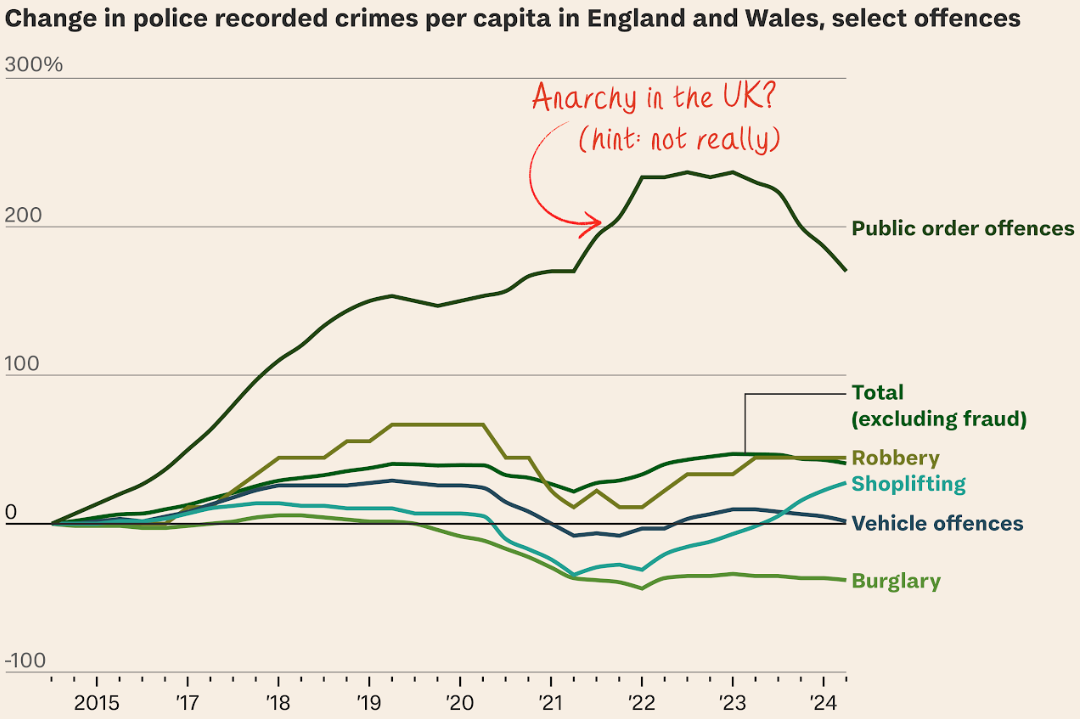
About 40 people have been sentenced so far in connection with the UK riots at the start of August. Sentences range from two months for criminal damage to three years for violent disorder. By contrast, five Just Stop Oil protestors were jailed in July for between four and five years for conspiring on a Zoom call to shut down the M25.
So what? If the scales of justice don’t seem fairly balanced, that’s because they aren’t. The discrepancy between relatively light sentences for race rioters and relatively heavy ones for eco-protesters is a function of
- process – most of the rioters have been swiftly dealt with and pled guilty while the JSO five had a jury trial;
- personality – judges are human, after all; and
- politics – the history of police and public order acts in the UK is a history of the British state bringing in laws to deal with temporal problems it finds infuriating.
The law. The maximum sentence available to judges for violent disorder, the most severe of the rioters’ offences so far tried, is three years. The maximum sentence for conspiracy to cause a public nuisance is ten years.
- The rioters are on trial for violent disorder as defined in the Public Order Act 1986. This was created to deal with the Miners’ Strike in 1984.
- The JSO protesters were on trial for public nuisance as defined by the Police, Crime and Sentencing Act of 2022 and the Public Order Act of 2023. These were created to deal with climate change protests, specifically naming Extinction Rebellion and Just Stop Oil.
Public enemy number one. The first ever UK Public Order Act in 1936 banned political uniforms and required police consent before political marches went ahead. This was created to deal with Oswald Mosely’s British Union of Fascists.
Judge dread. Judge Christopher Hehir, who sentenced the JSO five, noted that
- protesters’ actions had caused people to miss flights, funerals, mock exams, medication, cancer clinic appointments, work and an appearance at the All Party Parliamentary Group for Water;
- a police motorcyclist was knocked off his bike; and
- the defendants had form in previous protests.
Hehir also dismissed their lack of violence and conscientious motives as non-mitigating.
Harsh, no? During the riots, around 150 police officers were injured and almost half of them hospitalised. Business, hotels and police stations were set alight. Shops were looted. Cars were burned. A number of people were beaten by mobs.
Yes, but. In the case of the rioters, the judiciary has moved with almost unprecedented speed in bringing the cases to court. Currently the average length of time from offence committed to sentencing in the UK is around a year. In Liverpool, rioters were in court and sentenced within a week. It’s a judicial choice at a time when the legal system is under strain, so the judges are either reflecting the state or society's views.
Soft touch. So far, none of the rioters has been charged with riot under the Public Order Act 1986 which carries a maximum sentence of ten years, although the Director of Public Prosecutions has said that is still a possibility.
Time to fold? Last week Liberty met with the Home Office to discuss dropping the Serious Disruption Regulations 2023, a set of amendments to the Police and Public Order Acts introduced by the former home secretary Suella Braverman that lowered the bar for disruption to be considered criminal.
The amendments were aimed specifically at environmental protesters, and they seem to have pleased Braverman more than the public.
- The High Court has since ruled them unlawful.
- Over the past five years juries have been acquitting environmental protestors who justified their crimes by explaining their beliefs.
The JSO five are appealing against their sentences. The question is whether the legal system can do better than politicians at reflecting the wishes of society.













